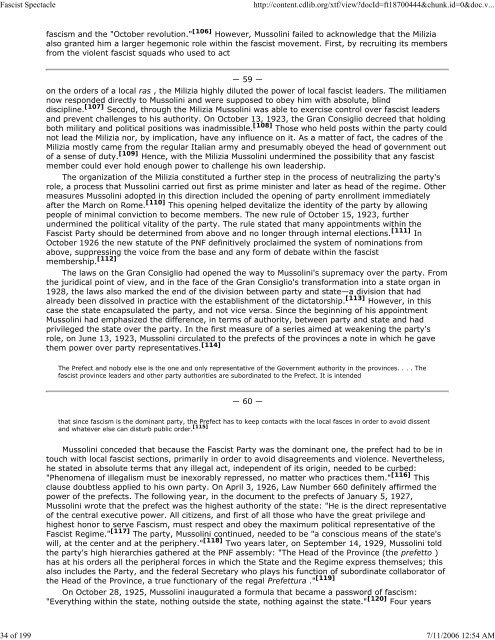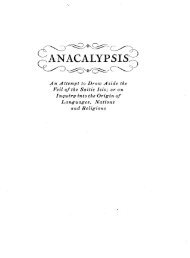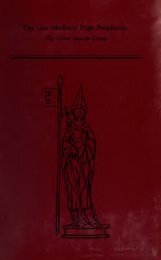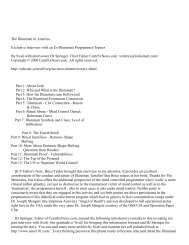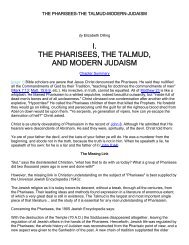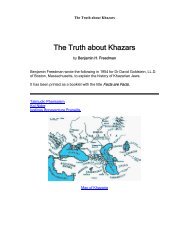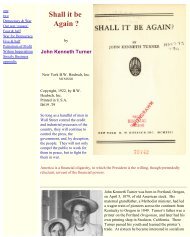Create successful ePaper yourself
Turn your PDF publications into a flip-book with our unique Google optimized e-Paper software.
<strong>Fascist</strong> <strong>Spectacle</strong> http://content.cdlib.org/xtf/view?docId=ft18700444&chunk.id=0&doc.v...<br />
fascism and the "October revolution." [106] However, Mussolini failed to acknowledge that the Milizia<br />
also granted him a larger hegemonic role within the fascist movement. First, by recruiting its members<br />
from the violent fascist squads who used to act<br />
― 59 ―<br />
on the orders of a local ras , the Milizia highly diluted the power of local fascist leaders. The militiamen<br />
now responded directly to Mussolini and were supposed to obey him with absolute, blind<br />
discipline. [107] Second, through the Milizia Mussolini was able to exercise control over fascist leaders<br />
and prevent challenges to his authority. On October 13, 1923, the Gran Consiglio decreed that holding<br />
both military and political positions was inadmissible. [108] Those who held posts within the party could<br />
not lead the Milizia nor, by implication, have any influence on it. As a matter of fact, the cadres of the<br />
Milizia mostly came from the regular Italian army and presumably obeyed the head of government out<br />
of a sense of duty. [109] Hence, with the Milizia Mussolini undermined the possibility that any fascist<br />
member could ever hold enough power to challenge his own leadership.<br />
The organization of the Milizia constituted a further step in the process of neutralizing the party's<br />
role, a process that Mussolini carried out first as prime minister and later as head of the regime. Other<br />
measures Mussolini adopted in this direction included the opening of party enrollment immediately<br />
after the March on Rome. [110] This opening helped devitalize the identity of the party by allowing<br />
people of minimal conviction to become members. The new rule of October 15, 1923, further<br />
undermined the political vitality of the party. The rule stated that many appointments within the<br />
<strong>Fascist</strong> Party should be determined from above and no longer through internal elections. [111] In<br />
October 1926 the new statute of the PNF definitively proclaimed the system of nominations from<br />
above, suppressing the voice from the base and any form of debate within the fascist<br />
membership. [112]<br />
The laws on the Gran Consiglio had opened the way to Mussolini's supremacy over the party. From<br />
the juridical point of view, and in the face of the Gran Consiglio's transformation into a state organ in<br />
1928, the laws also marked the end of the division between party and state—a division that had<br />
already been dissolved in practice with the establishment of the dictatorship. [113] However, in this<br />
case the state encapsulated the party, and not vice versa. Since the beginning of his appointment<br />
Mussolini had emphasized the difference, in terms of authority, between party and state and had<br />
privileged the state over the party. In the first measure of a series aimed at weakening the party's<br />
role, on June 13, 1923, Mussolini circulated to the prefects of the provinces a note in which he gave<br />
them power over party representatives. [114]<br />
The Prefect and nobody else is the one and only representative of the Government authority in the provinces. . . . The<br />
fascist province leaders and other party authorities are subordinated to the Prefect. It is intended<br />
― 60 ―<br />
that since fascism is the dominant party, the Prefect has to keep contacts with the local fasces in order to avoid dissent<br />
and whatever else can disturb public order. [115]<br />
Mussolini conceded that because the <strong>Fascist</strong> Party was the dominant one, the prefect had to be in<br />
touch with local fascist sections, primarily in order to avoid disagreements and violence. Nevertheless,<br />
he stated in absolute terms that any illegal act, independent of its origin, needed to be curbed:<br />
"Phenomena of illegalism must be inexorably repressed, no matter who practices them." [116] This<br />
clause doubtless applied to his own party. On April 3, 1926, Law Number 660 definitely affirmed the<br />
power of the prefects. The following year, in the document to the prefects of January 5, 1927,<br />
Mussolini wrote that the prefect was the highest authority of the state: "He is the direct representative<br />
of the central executive power. All citizens, and first of all those who have the great privilege and<br />
highest honor to serve Fascism, must respect and obey the maximum political representative of the<br />
<strong>Fascist</strong> Regime." [117] The party, Mussolini continued, needed to be "a conscious means of the state's<br />
will, at the center and at the periphery." [118] Two years later, on September 14, 1929, Mussolini told<br />
the party's high hierarchies gathered at the PNF assembly: "The Head of the Province (the prefetto )<br />
has at his orders all the peripheral forces in which the State and the Regime express themselves; this<br />
also includes the Party, and the federal Secretary who plays his function of subordinate collaborator of<br />
the Head of the Province, a true functionary of the regal Prefettura ." [119]<br />
On October 28, 1925, Mussolini inaugurated a formula that became a password of fascism:<br />
"Everything within the state, nothing outside the state, nothing against the state." [120] Four years<br />
34 of 199 7/11/2006 12:54 AM


